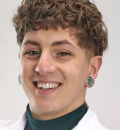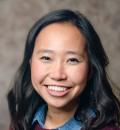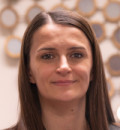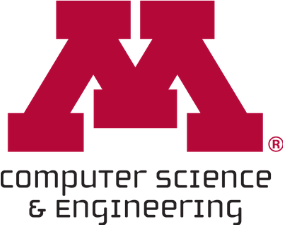EDI Panel
The GLBIO 2021 panel on equity, diversity, and inclusion (EDI) will bring together members of the community with diverse roles and backgrounds to share their perspectives on aspects of EDI that are relevant to the computational biology community. This will include discussions of The Personal, Policy, and Parameters. The Personal covers what we as individual scientists can do to foster EDI in our work and broader lives. Policy covers what our institutions, such as departments and schools, can do. Parameters cover the data side of EDI in computational biology, including promoting EDI in the data collection, analysis, interpretation, and dissemination of and for our scientific work. All GLBIO attendees will have the opportunity to share their own experiences with the panelists ahead of time through an anonymous survey. We look forward to an engaging and enlightening discussion with our most esteemed panelists.
Sponsors
 Edgar Arriaga
Edgar Arriaga
University of Minnesota
United States of America
Moderator
Dr. Edgar Arriaga (He/him) is the Northey Professor of Chemistry at the University of Minnesota, Minneapolis, MN, USA. After earning a “Licenciatura” (BSc.) degree at the Universidad del Valle de Guatemala in 1985, Edgar sought opportunities to pursue graduate school and moved to Halifax, Nova Scotia, Canada. The love for science was stronger than the culture shock he experienced and Edgar completed a Ph.D. in Chemistry from Dalhousie University in 1990. It took him two postdoctoral appointments, one at the University of Kansas Medical Center and one at the University of Alberta, to reaffirm his commitment to an academic career. Edgar joined the faculty of the Department of Chemistry at the University of Minnesota in 1990. His research on bioanalytical chemistry, supported through NIH, has been unveiling mysteries hidden by the innate heterogeneity of biological systems. His research team, a.k.a. the Organelle Group, is unique in its efforts of using novel measurements at the individual organelle level to investigate “Why we Age”. Dr. Arriaga is co-director of an NIH training grant, co-leader of the College of Science and Engineering (CSE) Diversity & Inclusivity (D&I) Alliance, Consultant for the Committee on Professional Training (CPT) of the American Chemical Society (ACS). Through these appointments and his personal life, Edgar strives to advance diversity, equity, inclusion, and respect for All.
 Joey Chamard
Joey Chamard
University of Sherbrooke
Canada
Joey started his scientific journey with a field technician degree. Then, he completed a bachelor’s degree in environmental microbiology, while working part-time in an academic laboratory. During this time, he specialized on mycorrhizae and root microbiota. Joey brings a philosophical and social point of view to everything that he’s involved, bringing refreshing and challenging questions to the everyday scientific life. In the next few years, he will be studying the interactions between the culturally and economically crucial maple trees and their relationship with the microbial communities of the rhizosphere, with an emphasis on arbuscular mycorrhizal fungi. In addition to being a passionate scientist, Joey is a multidisciplinary artist and a diversity, equity and inclusion advocate.
 Trang T Le
Trang T Le
University of Pennsylvania
United States of America
Dr. Trang Le is a postdoctoral researcher in the Computational Genetics Lab at the University of Pennsylvania. She enjoys developing machine learning methods for analyses of a wide array of biomedical data, including neuroimage, transcriptomic and genotype. She is a strong advocate for transparency in research to enable the public to engage with the work and perform peer-review.
 Tijana Milenkovic
Tijana Milenkovic
University of Notre Dame
United States of America
Prof. Milenkovic has been a Notre Dame faculty since 2010, after earning her Ph.D. degree in Computer Science from the University of California Irvine in the same year. She was promoted to an Associate Professor with tenure in 2016. She was appointed a Frank M. Freimann Collegiate Associate Professor of Engineering in 2020. Milenkovic lab solves challenging problems in the fields of network science, graph algorithms, computational biology, scientific wellness, and social networks. Prof. Milenkovic won 2015 NSF CAREER and 2016 Air Force Office of Scientific Research Young Investigator Program (AFOSR YIP) awards. Also, she has acted as the sole or lead Principal Investigator on 5 other awards by NSF or NIH. The research awards that Prof. Milenkovic has participated in total to $18.7 million. She has published 50 journal papers (e.g., in Science, PNAS, or Bioinformatics) and 16 conference papers (e.g., in ISMB/ECCB). Prof. Milenkovic's papers have attracted over 3880 citations; her i10-index is 42 and h-index is 28. Prof. Milenkovic was elected to the Board of Directors of the International Society for Computational Biology (ISCB) in 2020 to represent the Society’s Communities of Special Interest (COSIs). Prof. Milenkovic has been an Associate Editor of IEEE/ACM TCBB since 2014, of Scientific Reports since 2018, and of Frontiers in Bioinformatics - Network Bioinformatics since 2020. She has been an active organizer of the flagship Network Biology (NetBio) COSI meeting at ISMB/ECCB since 2017, and of the Great Lakes Bioinformatics Conference since 2015. Prof. Milenkovic is committed to increasing participation of women and diversity in Computer Science. She has acted as a leader of or committee member for numerous departmental-, college-, university-, and international community-level Equity, Diversity, and Inclusion (EDI) initiatives.
 Melyssa Minto
Melyssa Minto
Duke University
United States of America
Melyssa Minto(She/her) is a PhD Candidate in the Computational Biology & Bioinformatics program at Duke University where she is researching how to model transcription factor programming in maturing cerebellar granules neurons using high throughput sequencing data within the West Lab. She received a B.S. in Mathematics and a B.S. in Biology at Meredith College. Melyssa was born in Jamaica, and raised in Durham, NC. As an undocmented Black woman, she faced many hurdles getting into research which has driven her passion for diversity and equity in STEM and academia. She regularly volunteers with Black Girls Code and in local high schools. Recently, she has become heavily involved within the leadership of the Black Women in Computational Biology Network where she has helped to expand and strengthen the connections within the network and showcase the diversity within the computational biology field.
 Russell Schwartz
Russell Schwartz
Carnegie Mellon University
United States of America
Russell Schwartz is a Professor of Biological Sciences and Computational Biology at Carnegie Mellon University and Head of the Carnegie Mellon Computational Biology Department. He has worked broadly in computational biology research, with particular contributions to computational genetics/genomics and computational biophysics and with a recent focus largely on computational cancer biology. He has also been active in bioinformatics education, where he has worked on developing standards for computational biology education of both computational biology specialists and experimental biologists. He currently serves as co-chair of the International Society for Computational Biology (ISCB)’s Education Community of Special Interest (COSI) and as a member of the ISCB Board of Directors.






